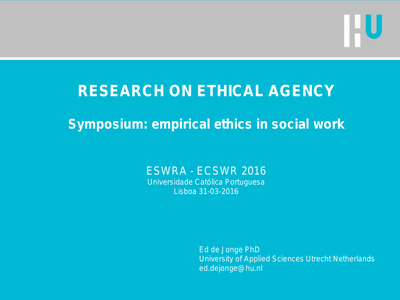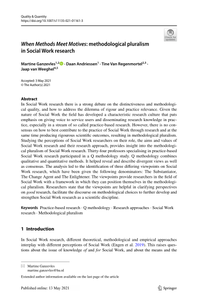Vergelijkende Europese studie in opdracht van Kees van Aken, toenmalig directeur van de opleiding Social Work i.o. van de Hogeschool Zuyd, naar welke verschillende varianten er mogelijk zijn als er gesproken wordt over een Internationale Bachelor Social Work - Maastricht. Op welke manieren zijn er in Europa reeds internationale bachelors zijn ontwikkeld. Het onderzoek moet een overzicht van enkele blauwdrukken van een Internationale Bachelor Social Work opleveren, om mede op basis daarvan een keuze te maken voor een (eventueel meerdere) voor Hogeschool Zuyd wenselijke variant(en) daarvan in Maastricht. Er is vergelijkend Europees onderzoek gedaan naar de verschillende filosofieën en organisatievormen van curricula International Social Work zoals die op verschillende Hogescholen en Universiteiten in Europa functioneren. Met name zijn “good practice” ervaringen onderzocht en met elkaar vergeleken, om op basis daarvan een aantal varianten helder te krijgen voor de opdrachtgever.
DOCUMENT

This research aims to contribute to a better understanding of strategic collaborations between work-integration social enterprises (WISEs) and for-profit enterprises (FPEs) with the joint objective to improve labour market opportunities for vulnerable groups. We find that most collaborations strive towards integration or transformation in order to make more social impact.
LINK
Symposium ESWRA - ECSWR 2016: empirical ethics in social work. Objective: ethical aspects of social work (esp. at home) Structure: cooperation of the research group of UAS Utrecht Netherlands with six regional welfare organizations Method: practice based ethics research Focus on professional practice: learning from moral experiences in frontline practice (cf. Van Doorn, 2008) Hybrid approach: combining theoretical resources and professional practice (cf. Banks & Gallagher, 2009) Mixed methods: desk research, interviews, best practice units (BPU), development of ethical tools
DOCUMENT

The knowledge base for Social Work is strengthening. Underpinning of Social Work deriving from scientific research is necessary given the growing complexity of the work and its context. How this research should be conducted and to what type of outcomes it must lead, is part of an ongoing debate. In the Netherlands, practice-based research at Universities of Applied Sciences (UAS) is a relative new approach. Social Work research groups at UAS assert to conduct practice-based research in order to contribute to knowledge and support the objectives of Social Work. The current study was carried out to obtain insight into the characteristics of this research approach. A sample of publications was analysed in terms of knowledge purpose, methodology, and level and type of participation. Results show a strong focus on producing descriptive knowledge and to a lesser extent on control knowledge, using primarily qualitative research methods, and with limited direct participation by stakeholders. In order to practice more what they preach the research can strengthen by doing more empirical research, by diversifying the research in terms of design and methods and increasing the level of participation of stakeholders
DOCUMENT

In Social Work research there is a strong debate on the distinctiveness and methodological quality, and how to address the dilemma of rigour and practice relevance. Given the nature of Social Work the field has developed a characteristic research culture that puts emphasis on giving voice to service users and disseminating research knowledge in practice, especially in a stream of so called practice-based research. However, there is no consensus on how to best contribute to the practice of Social Work through research and at the same time producing rigourous scientific outcomes, resulting in methodological pluralism. Studying the perceptions of Social Work researchers on their role, the aims and values of Social Work research and their research approach, provides insight into the methodological pluralism of Social Work research. Thirty-four professors specialising in practice-based Social Work research participated in a Q methodology study. Q methodology combines qualitative and quantitative methods. It helped reveal and describe divergent views as well as consensus. The analysis led to the identification of three differing viewpoints on Social Work research, which have been given the following denominators: The Substantiator, The Change Agent and The Enlightener. The viewpoints provide researchers in the field of Social Work with a framework in which they can position themselves in the methodological pluralism. Researchers state that the viewpoints are helpful in clarifying perspectives on good research, facilitate the discourse on methodological choices to further develop and strengthen Social Work research as a scientific discipline
DOCUMENT

Presentation at the European Conference for Social Work Research, Leuven: Belgium
DOCUMENT

Presentation at the 6th International Conference on Sociology and Social Work – Zwolle, The Netherlands, 24 and 25th August 2016
DOCUMENT
Poster presentation at the European Social Work Research Conference - ESWRA, Aalborg, Denemarken, 20 april – 21 April In the last decade a call is made upon a stronger knowledge base for social work and an abiding professionalism of practice. Transformations in The Netherlands state welfare regime are amongst others a big impetus for this demand. Universities of Applied Sciences (UAS) contribute substantially in answering this legitimation call. UAS in The Netherlands adopted a research function since 2000 and practice oriented research is prevailing in their type of reseach. Both fields, social work practice and social work research as conducted by UAS, are relatively new and are to a certain degree reinventing themselves. It makes practice oriented social work research a timely topic. This poster presents the outline and aim of the PhD research on how to optimise practice.
DOCUMENT

Social work is a profession that is very much part of and contributes to an ever changing and evolving society. It is therefore essential that social work is able to respond to the diverse and dynamic demands that it may encounter in that society and in the future. The critique of social work is, however, present and growing. The profession can no longer deny or ignore the need to legitimize its value and effectiveness. In this article, a research project – entitled Procivi – aimed at developing a method of legitimizing social work is presented. The method developed in Procivi proposes a way of legitimizing social work through the development of reflective professionals. The method teaches professionals to take a research frame of mind towards their own practice and helps them develop a vocabulary to describe their work to different audiences. The paper discusses whether and how this method forms a viable way of legitimizing social work and as such could be an alternative for the growing demand for social work based on scientific evidence (evidencebased practice, EBP).
MULTIFILE

Deze publicatie richt zich vooral op het concept Design Based Research,gezien vanuit het perspectief van de bijna 40 lectoren die de hogeschool rijk is. Dit lectoratenoverzicht kan worden beschouwd als een atlas of reisgids waarmee de lezer een route kan afleggen langs de verschillende lectoraten. De lectoraten die actief zijn op het gebied van de Service Economy worden beschreven in hoofdstuk 2. De lectoraten die actief zijn op het gebied van Vitale Regio worden beschreven in hoofdstuk 3. De lectoraten die actief zijn op het gebied van Smart Sustainable Industries worden beschreven in hoofdstuk 4. De lectoraten die actief zijn op het gebied van de hogeschoolbrede thema’s Design Based Education en Research worden beschreven in hoofdstuk 5. Tenslotte wordt er in hoofdstuk 6 een eerste aanzet gedaan om één of meer verbindende thema’s of werkwijzen te ontdekken in de aanpak van de verschillende lectoraten. Het is niet de bedoeling van deze publicatie om een definitief antwoord te geven op de vraag wat NHL Stenden precies bedoelt met het concept Design Based Research. Het doel van deze publicatie is wel om een indruk te krijgen van wat er allemaal gebeurt binnnen de lectoraten van NHL Stenden, en om nieuwsgierig te worden naar meer.
DOCUMENT
